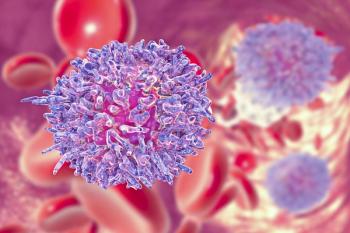
Patients with various solid tumor types experienced improved antitumor immunity after adhering to a diet with severe caloric restrictions.

Lindsay Fischer is an editor at ONN. She joined MJH life sciences in 2021 after graduating from Rutgers University with majors in both English and Spanish and a minor in creative writing. When she is not writing, or researching the latest oncology nursing news, Lindsay is an amateur backpacker and rollerblader. Email Lindsay at lfischer@mjhlifesciences.com

Patients with various solid tumor types experienced improved antitumor immunity after adhering to a diet with severe caloric restrictions.

A study conducted by Embracing Carers found that unpaid caregivers experienced negative key changes during the COVID-19 pandemic.

Bruce Carleton, PharmD, FCP, FISPE, discusses the implications of research findings indicating that very young children are at a higher risk of cisplatin-induced hearing loss.

Christopher Zorn, clinic operations administrator of Winship Cancer Institute at Emory University, discusses how Winship Cancer Institute fosters a safe, yet festive, holiday environment during the COVID-19 pandemic.

Andrew Kass, MSN, RN, AGNP-C, AOCNP, discusses the impact fatigue can have on patients with cancer and how oncology nurses and APPs can help their patients address this common adverse event.

Mental health was recognized as a priority by most oncologists. However, few felt they had the proper resources to provide adequate support. In addition, palliative care was found to be prescribed or referred too late.

Patients with high levels of amphiregulin were at a higher risk of an early death in acute graft-versus-host-disease, according to a presentation at the 2021 ASH Annual Meeting.

Belantamab mafodotin is an antibody-drug conjugate that functions by targeting BCMA and has demonstrated clinically meaningful activity in relapsed/refractory multiple myeloma.

On this episode of “The Vitals,” an expert in genetics discusses ongoing research to address cisplatin-induced hearing loss in pediatric patients with cancer.

A presentation at the 2021 ASH Annual Meeting revealed a significant association between elevated white blood counts and thrombotic events among patients with polycythemia vera and controlled hematocrit levels.

Aromatase inhibitors were revealed to be more effective than tamoxifen in reducing the rate of recurrence in ER+ breast cancer among premenopausal women receiving ovarian suppression.

A secondary analysis of 2 treatment alterations studies demonstrated that 18F-fluciclovine PET/CT scans play a pivotal role in determining if androgen deprivation therapy is appropriate for patients with prostate cancer.

Urine cytology specimen NGS was found to be a feasible and valid method of assessing genomic alterations in patients with upper tract urothelial carcinoma.

The FDA has approved the combination of rituximab plus chemotherapy to treat children aged between 6 months and 18 years who have advanced-stage, CD20-positive diffuse large B-cell lymphoma (DLBCL), Burkitt lymphoma (BL), Burkitt-like lymphoma (BLL), or mature B-cell acute leukemia (B-AL).

Sarah Donahue, MPH, AOCNP, shares what drew her to oncology, the daily challenges she faces as a nurse practitioner, and her advice to new oncology nurses on how to overcome those barriers.

The FDA has granted an approval to a subcutaneous daratumumab combination to treat adults with relapsed/refractory multiple myeloma.

In this episode of “The Vitals,” 2 health care professionals discuss how to safely celebrate the holidays in oncology units.

Although White women and Black women carry similar rates of pathogenic variants, a study found that White women were almost 5 times more likely to undergo genetic counseling and testing.

Among patients who had participated in telemedicine, 45% preferred it to in-office visits, highlighting the need to make telemedicine a priority in cancer care.

The implementation of the HuCare Quality Improvement Strategy supported superior emotional function for patients newly diagnosed with cancer.

The FDA approval of sirolimus protein-bound particles marks the first approved therapeutic option for patients with advanced PEComa.

Joe Contreras, MD, chair of the Institute of Pain and Palliative Medicine, explains how some common misconceptions may be hindering patients from receiving potentially outcome-improving palliative care.

Pembrolizumab represents the first immunotherapy approved to treat patients with renal cell carcinoma in the adjuvant setting.

A total of 7.4% of patients received a secondary or downstream procedure within the 12 months following their lung cancer screening.

For National Hospice and Palliative Care Awareness Month, Joe Contreras, MD, spoke to Oncology Nursing News® about some common misconceptions between the 2 and how oncology nurses can more effectively speak with their patients about palliative care.

David Hui, MD, MSc, from The University of Texas MD Anderson Cancer Center, discusses the impacts of personal sedation goals for caregivers of patients with cancer experiencing end-of-life agitated delirium.

“Health care providers should be aware of this gap in care for dual-eligible patients and other vulnerable populations so that needs can be identified and resources can be appropriately directed.”

In addition to experiencing poor emotional health, a high percentage of nurses have experienced trauma and a desire to leave their position because of the COVID-19 pandemic.

A recent study found that nurses demonstrated a higher preference for deep sedation to treat patients with cancer-related delirium, compared with caregivers.

Cisplatin-induced hearing loss was found to be more prevalent in very young children receiving treatment; therefore, findings suggest that audiological monitoring be conducted in a standardized manner for those undergoing this treatment.